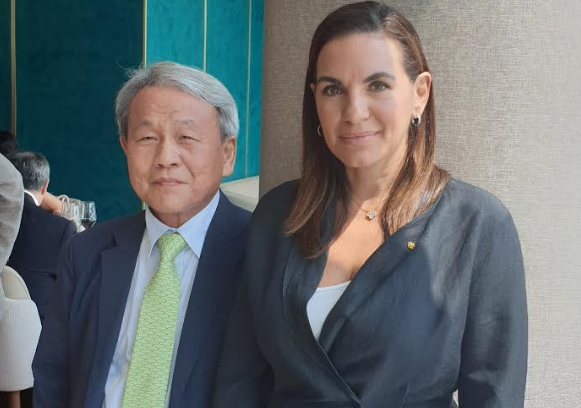
[This opinion article was contributed by columnist Choe Chong-dae.]
SEOUL, November 04 (AJP) - Throughout history, countless thinkers and philosophers have drawn inspiration from ancient Greece. Among them, Johann Wolfgang von Goethe (1749–1832) held a lifelong admiration for Greek civilization, seeing in its art, philosophy, and culture the supreme ideals of beauty, harmony, and humanity. He once proclaimed, “Become like the Greeks! They lived divinely.”
Inspired by such timeless admiration, my own fascination with Greece was awakened by the exhibition “The Body Beautiful in Ancient Greece,” sponsored by The Chosun Ilbo and presented with treasures from the British Museum at the National Museum of Korea in 2010. Among its 135 masterpieces—sculptures, bronzes, and painted vases—I came to see the human body as the Greeks once did—not simply as flesh and form, but as an enduring expression of beauty, harmony, and meaning.
I recently had the honor of meeting H.E. Olga Kefalogianni, Minister of Tourism of the Hellenic Republic, at a welcoming luncheon held on August 27 at Hotel Naru, Mapo in Seoul, graciously hosted by H.E. Mr. Loukas Tsokos, Ambassador of Greece to the Republic of Korea. Our conversation reaffirmed Greece’s deep dedication to promoting cultural exchange and sustainable tourism, as well as its growing partnership with Korea in the travel sector.
Greece stands as a land of timeless allure, where distinctive ancient cultural heritage sites and historic cities blend gracefully with sunlit coastlines, eco-tourism trails, and a vibrant modern society. It is a nation where tradition and modernity meet in harmony, and where every journey transcends leisure—becoming a passage through philosophy, history, and the living spirit of culture.
Accessibility is also an important priority. The Greek government is working closely with airlines, and the Ministry of Tourism is currently in discussions with Korean Air to establish the first direct flights between Athens and Incheon. Such an initiative would not only make Greek destinations more accessible to Korean travelers but also strengthen cultural and human exchanges—serving as a symbolic bridge linking the two nations through shared values and friendship.
Beyond tourism, the resonance between Greece and Korea runs deeper, reflecting a mutual appreciation for history, culture, and universal ideals. Greece, the cradle of Western civilization, is celebrated for its philosophical traditions, theatrical genius, and foundational contributions to science, mathematics, democracy, and the Olympic Games. Universal values such as human rights, freedom, and justice trace their roots to ancient Greece—principles that continue to inspire nations around the world, including Korea, in their pursuit of peace and progress.
Remarkably, traces of Hellenic culture appear in Korea’s history, visible in artifacts that reflect distant influences and long-standing cultural exchanges.
Currently, the National Museum of Korea, steward of the nation’s heritage, preserves countless relics, including a remarkable Greek-influenced artifact—a phoenix-shaped glass bottle from the tomb of Hwangnamdaechong in Gyeongju, the ancient capital of the Silla Dynasty.
Standing 25 cm tall, this 5th–6th century bottle was unearthed in 1975 as fragments and later restored in the 1980s. Its form closely resembles the Greek Oinochoe (wine pitcher). The egg-shaped body, wavy spout, and delicate blue glass bands combine Silla artistry with Mediterranean craftsmanship, reflecting the rich cultural and trade exchanges that once traveled along the Silk Road.
Modern history, too, binds the two nations. Following the outbreak of the Korean War in 1950, Greece dispatched more than 10,000 troops as part of the United Nations Allied Forces. Their sacrifice and humanitarian spirit made a profound contribution to defending Korea’s freedom and democracy—a noble gesture deeply cherished and remembered by the Korean people.
Presently, as Greece seeks to strengthen ties with Korea through tourism, the endeavor carries deeper meaning. It is not simply about leisure or commerce, but about honoring centuries of cultural connection and reaffirming a friendship forged in sacrifice. Tourism, in this sense, becomes a bridge of empathy, understanding, and shared values.
As direct flights draw the two nations closer, the horizon of cooperation widens beyond tourism to embrace cultural exchange, academic collaboration, and enduring people-to-people bonds—the true bedrock of their relationship. The worldwide resonance of K-culture has not escaped Greece’s notice and may well serve as a vibrant bridge for deeper tourism and cultural partnership.
Two months after the visit of the Greek Minister of Tourism to Korea, the “Greek Day in Seoul” event was held at Yiayia and Friends in Sinsa-dong, Gangnam-gu, Seoul, on October 30. The occasion offered a delightful celebration of authentic Greek products, cuisine, and wine. Guests were warmly welcomed by Mr. Konstantinos Daskalopoulos, Counsellor and Head of the Economic Diplomacy Department at the Greek Embassy in Seoul. It was a wonderful opportunity to experience the rich flavors and warm hospitality of Greece and its vibrant culinary culture.
As the lingering taste of Greek wine, Grande Reserve (2019), caressed my palate, my spirit seemed to commune with the soul of ancient Greece, transported back to the bygone days when the Hellenic world shone as the cradle of art, wisdom, culture, and harmony.
The majority of guests at the event were excited to learn about plans to establish the first direct flights between Athens and Incheon in the near future.
Although Korea and Greece may be geographically distant, the two nations share a profound respect for culture, tradition, and hospitality. As I reflected on my encounter with Minister Kefalogianni, I was reminded that tourism transcends leisure — it is a living dialogue between civilizations. As a Korean who has long admired Greece’s distinctive cultural legacy, I believe our two nations stand at the threshold of a renewed partnership.
The truest form of diplomacy lies in the warmth of people-to-people exchange — in those encounters that bridge hearts across borders and generations. By deepening these enduring bonds of friendship and trust, we not only honor the connections of the past but also open new pathways toward a future illuminated by empathy, mutual respect, and shared values.
Copyright ⓒ Aju Press All rights reserved.




